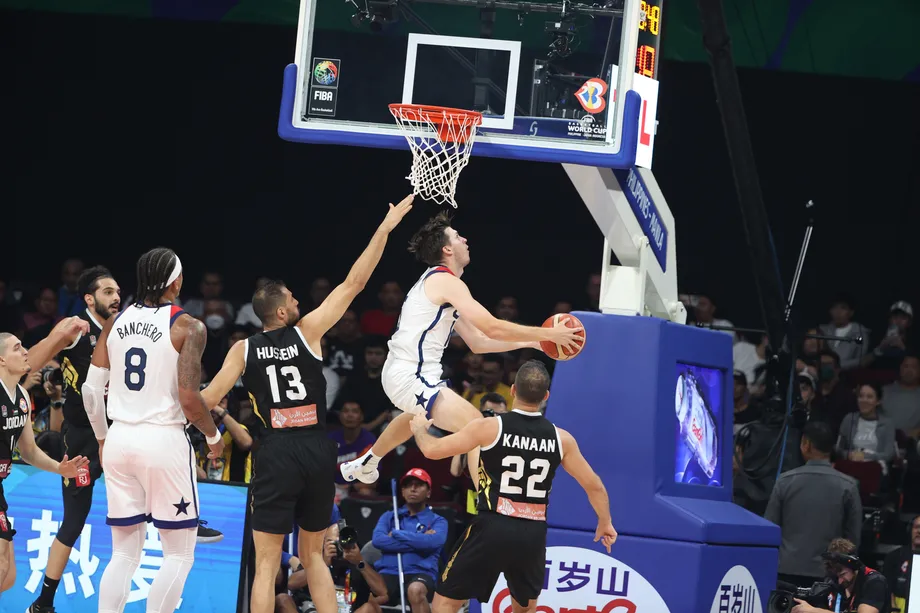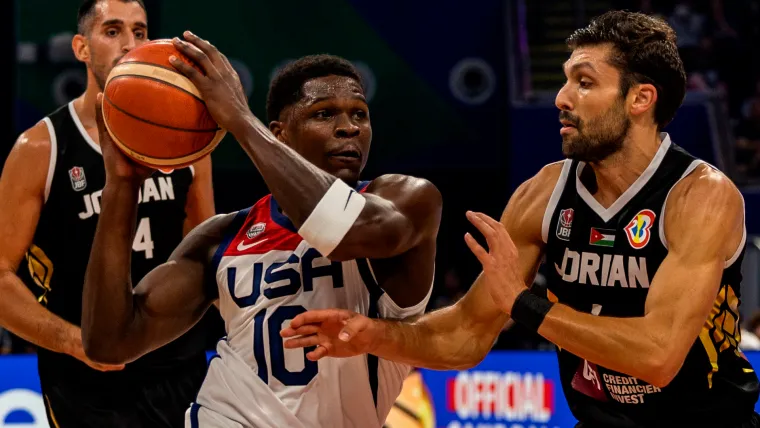
In the ongoing 2023 FIBA World Cup, Team USA showcased their dominance with a resounding victory over Jordan, securing a score of 110-62. The match not only highlighted Team USA’s strong start but also revealed the impact of a lineup change that head coach Steve Kerr implemented.
Lineup Change Sparks Performance Improvement
The most notable aspect of Team USA’s triumph was the altered lineup that Coach Kerr deployed for the game. After using the same starting five players for the first two matches of the FIBA World Cup, Kerr made a strategic adjustment by inserting forward Josh Hart into the frontcourt alongside center Jaren Jackson Jr. This change replaced swingman Brandon Ingram in the starting lineup.
“We just felt like it was important to take a look at Josh with the starting group and Brandon with the next group, and see if the combinations fit,” Kerr explained.
Strong Start and Sustained Momentum
Team USA’s new lineup seemed to click immediately, as they stormed into the game with a dominant performance. The Americans built a substantial 20-4 lead, showcasing their offensive prowess and defensive prowess. This marked a significant improvement from their previous matches in the FIBA World Cup.
Former Wildcats Shine Together
With Hart joining his Villanova teammates Jalen Brunson and Mikal Bridges on the court, the synergy between the three former Wildcats was evident. Their seamless coordination and chemistry on the court were highlighted by their ability to create open looks from beyond the arc through swift passes and intelligent playmaking.
“Playing with JB all those years and Josh as well, it’s just second nature. All those practices and games we had at ’Nova, it just feels so natural,” Bridges remarked.
Edwards’ Impact and Arena’s Reaction
Anthony Edwards emerged as a standout player for Team USA in the game. His explosive athleticism and scoring ability were on full display, as he contributed a game-high 22 points. One of the game’s most exciting moments came when Edwards executed a spectacular windmill dunk, sending the arena into a frenzy.
A Different Atmosphere
While the atmosphere was electric in the Mall of Asia Arena, there was a noticeable contrast between the two teams’ performances. Jordan’s offensive struggles led to moments of silence in the crowd, in stark contrast to the cheers that accompanied Team USA’s dominant plays.
Looking Ahead to the Knockout Stage
Although Team USA’s victory was convincing, it’s important to consider the level of competition faced. The upcoming stages of the FIBA World Cup promise stronger opponents, such as Lithuania and Montenegro, who boast formidable lineups and experienced players with NBA backgrounds. The knockout stage presents new challenges that Team USA will need to prepare for.

Performance Statistics: Team USA vs. Jordan
In the thrilling clash between Team USA and Jordan at the 2023 FIBA World Cup, the numbers tell a story of intense competition and skillful execution. The performance statistics provide insights into the dynamics of the game, highlighting key areas where both teams excelled and faced challenges. Let’s delve into the data that shaped this memorable encounter:
| Category | Team USA | Jordan |
| Field Goal Attempts | 80 | 66 |
| Field Goals Made | 39 | 22 |
| Field Goal Percentage | 48.8% | 33.3% |
| 2-Point Attempts | 51 | 45 |
| 2-Point Field Goals Made | 29 | 17 |
| 2-Point FG Percentage | 56.9% | 37.8% |
| 3-Point Attempts | 29 | 21 |
| 3-Point Field Goals Made | 10 | 5 |
| 3-Point FG Percentage | 34.5% | 23.8% |
| Free Throw Attempts | 28 | 17 |
| Free Throws Made | 22 | 13 |
| FT Percentage | 78.6% | 76.5% |
| Rebounds | ||
| Offensive Rebounds | 17 | 7 |
| Defensive Rebounds | 39 | 27 |
| Total Rebounds | 56 | 34 |
| Assists | 29 | 15 |
| Blocks | 6 | 2 |
| Turnovers | 15 | 6 |
| Steals | 23 | 13 |
| Personal Fouls | 11 | 12 |
Confidence and Readiness
In the high-stakes arena of international basketball, the significance of confidence and readiness can’t be overstated. Team USA’s recent triumph over Jordan in the 2023 FIBA World Cup wasn’t just about points on the scoreboard; it was a masterclass in how these attributes can shape a team’s destiny.
From a strategic change in the starting lineup to the seamless chemistry between players, the game’s dynamics reflected Team USA’s renewed self-belief and their ability to adapt on the fly. The journey to this victory was paved with key elements that showcased their confidence and readiness:
- Adaptability: Learning from the lessons of their earlier matches, Team USA displayed remarkable adaptability, leveraging their collective experience and basketball IQ to devise a winning formula.
- Unity: The unity of purpose within the team was palpable – it was evident in their on-court communication, their synchronized plays, and their mutual trust.
- Composure: In high-pressure moments, Team USA didn’t falter. Their composure under duress, coupled with their ability to execute crucial shots and maintain solid defense, attested to their mental resilience.
- Innovation: While they embraced innovation with a change in the starting lineup, they also balanced it with consistency, keeping their core strengths intact.
- Seizing Momentum: The most telling sign of their growing confidence was their willingness to seize momentum. The win over Jordan wasn’t just a victory; it was a statement – a testament to Team USA’s readiness to take charge and dictate the course of the game.
As the FIBA World Cup continues, Team USA’s confidence and readiness remain their allies, propelling them forward. These attributes are the anchors that keep them grounded and the wings that help them soar, making every game a showcase of their unwavering determination and the heights they can achieve.































